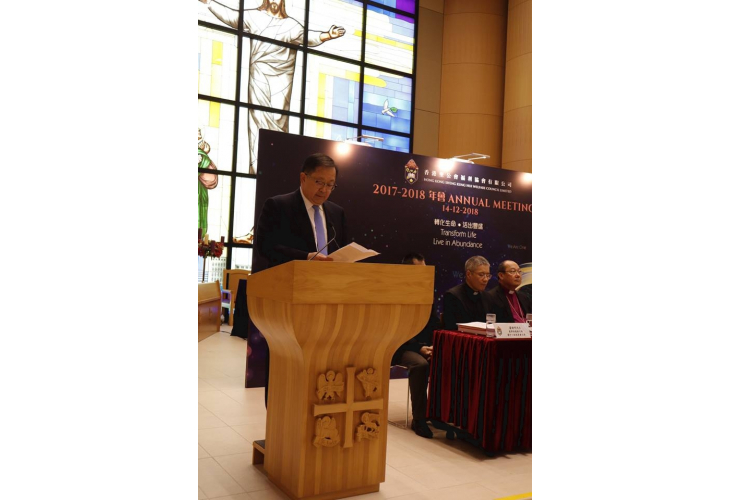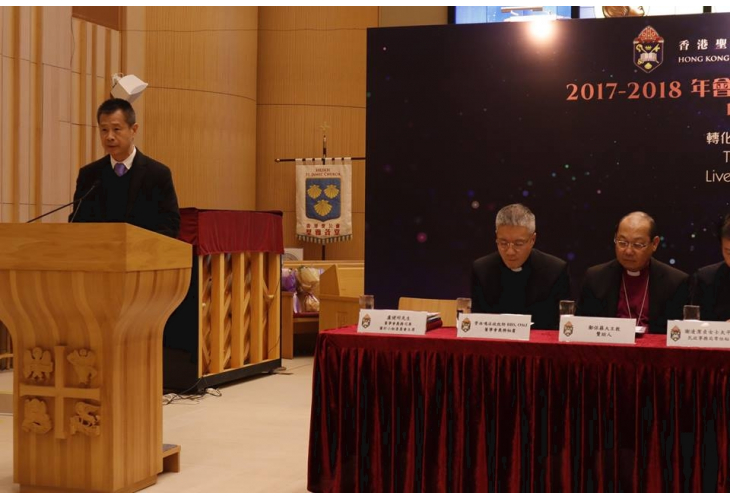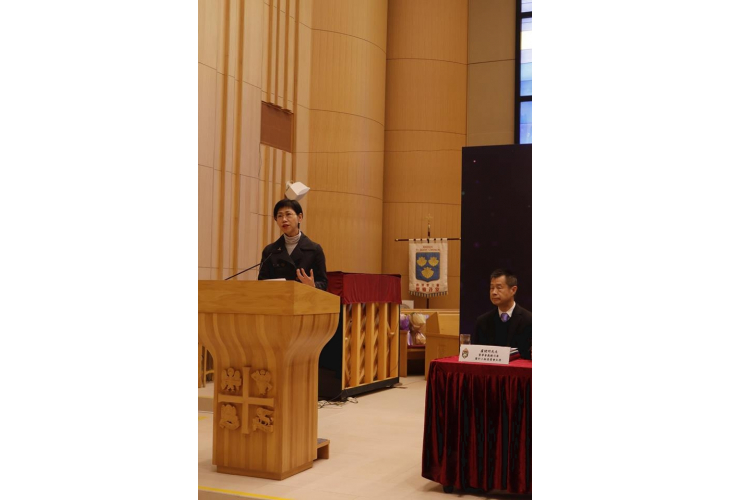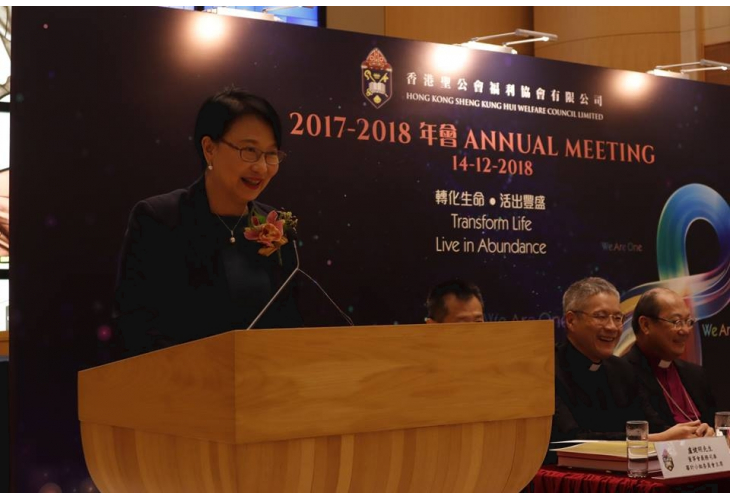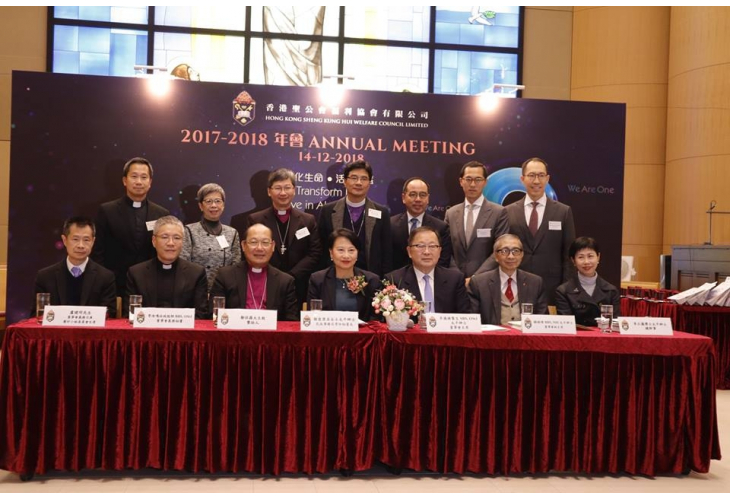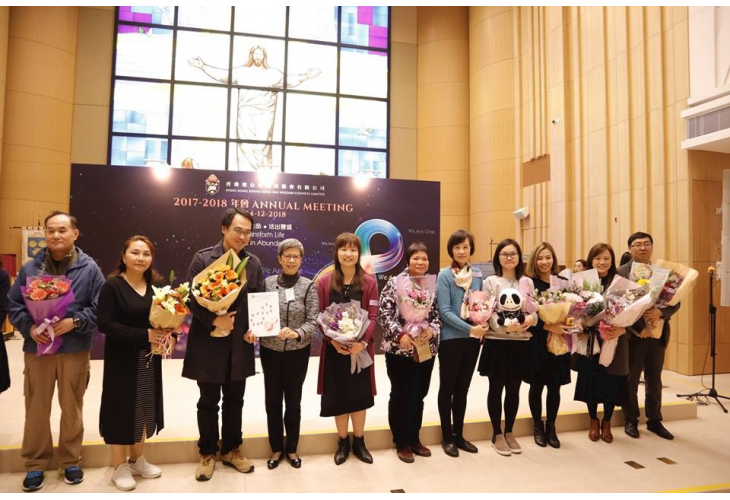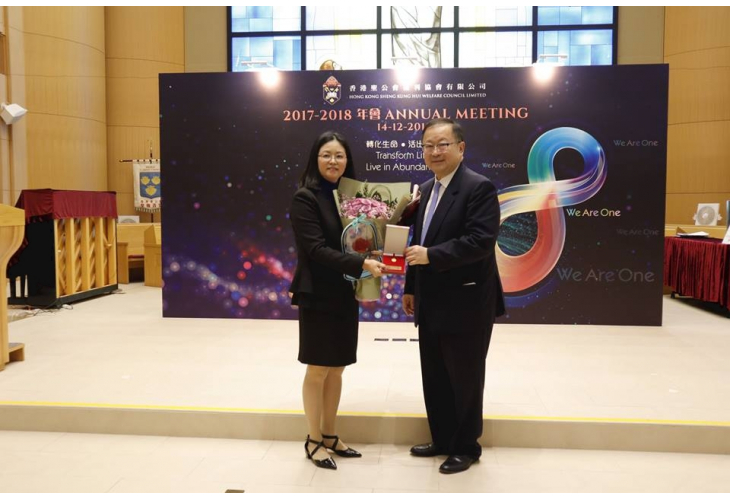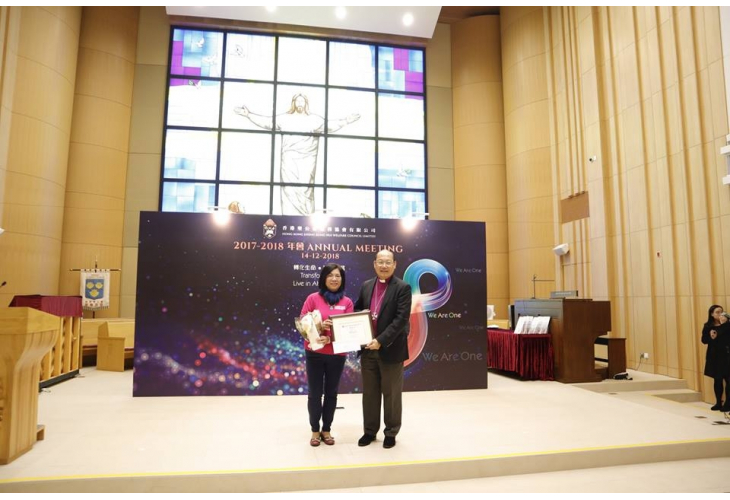The Hong Kong Sheng Kung Hui Welfare Council (the Welfare Council) held its Annual Meeting for the year 2017 to 2018 on 14th December at the H.K.S.K.H. St James’ Church. The officiating guest, Mrs Cherry Tse, JP, Permanent Secretary for Home Affairs, joined the Most Revd Dr Paul Kwong, Honorary Patron of the Welfare Council, the Rt Revd Andrew Chan, Bishop of the H.K.S.K.H. Diocese of Western Kowloon, the Rt Revd Dr Timothy Kwok, Bishop of the H.K.S.K.H. Diocese of Eastern Kowloon, members of the Board of Directors and Executive Committees, and almost 1,000 staff members to celebrate the end of another fruitful year.
During the meeting, Dr Donald Li, SBS, OStJ, JP, Chairman of the Welfare Council Board of Directors, noted that the Council involved 3,000 employees at the formulation process of the new 5-Year Strategy Plan last year. This has resulted in the naming of 4 key strategies—“Co-creation with Multidimensional Intervention”, “Technological Application”, “Leadership Development” and “Work Simplicity”.
Looking ahead, the Welfare Council will adopt a two-pronged strategy to reinforce and develop its services. On the one hand, the Council will reinforce its existing professional services to support individuals of different ages and backgrounds in line with its service philosophy—“Personalised Service, Holistic Care”, and on the other, will foster multidisciplinary collaborations by interfacing social services with medical services, technological application, environmental protection and architectural design. Through a multi-interventional approach, the Council could respond to the needs of our ever-changing society.
Moreover, the Welfare Council’s “Servanthood Leadership Development Plan” has been launched after two years of preparation, which aims to cultivate leaders of the Council in the aspects of spiritual growth, management and leadership skills.
Given our officiating guest, Mr Matthew Cheung, Chief Secretary for Administration, could not attend the Annual Meeting due to his busy schedule, Mrs Cherry Tse, JP, Permanent Secretary for Home Affairs, gave a speech on behalf of him. In her speech, she said the Sheng Kung Hui is not only a religious group but also a social service organisation which is a good partner of the government, and plays a crucial role in improving people’s livelihood and fostering social integration.
She also mentioned that the government would continue to promote collaboration among the community, the business sector and the government so as to facilitate policies on labour, welfare, elderly and supporting the disadvantaged, as well as work together with the public to bring support to those in need. For example, the Social Welfare Department has increased the number of service places of “On-site Pre-school Rehabilitation Services” launched in 2015 from 3,000 to 7,000, which enabled more kindergartens, kindergarten-cum-child care centres and children with special needs to benefit from the services.
In addition to establishing 5 more district support centres for persons with disabilities and strengthening rehabilitation services, the government would increase the number of support centres for persons with autism from 3 to 5 and provide extra manpower to the centres. The Home Affairs Bureau also expected to offer home-based care services to additional 1,800 disabled persons in the community. To cope with the challenges of an ageing population, the government also set up the $1 billion Innovation and Technology Fund, which has been open for application.
Dr Jane Lee, Director of the Welfare Council, also briefed the attendees on the work we have done in response to different needs of the society:
- Housing Problems: The Council has joined the “Community Housing Movement” of the Hong Kong Council of Social Service (HKCSS) as one of the operators to provide transitional accommodation to 120 underprivileged families. Located on To Kwa Wan Road, the “Good Homes” project aims to encourage co-living and co-management and promote neighbourly culture.
- Ageing Population: The increase in the number of elders who have chronic diseases is a trend in our ageing community. Medical-social collaboration is one of the key directions of the Council in response to the increased demand for primary care. The Council ‘s 7 elderly centres have been a part of the “Community e-Health Care Project”, which is funded by Hong Kong Jockey Club Charities Trust and hosted by the Senior Citizen Home Safety Association. E-health stations were set up based on a technological and innovative service model, elders were encouraged to build healthy lifestyles. Besides, the Council launched a 3-year pilot project called “E-Therapist” in November. The project was designed to help elders develop and maintain the habit of exercise and improve their knowledge on knee pain, as well as preventing pain from contributing to worsening health conditions.
- Special Educational Needs (SEN) Service Development: The Council has been offering services under the “Pilot Scheme on On-site Pre-school Rehabilitation Services” since establishing the “Love to Learn Enhancement Centre” and “We Love: Jockey Club Centre for Family Enhancement”. Upon the regularisation of the services, the Council received funding from the Social Welfare Department to support 275 SEN cases in 45 kindergartens. Meanwhile, the Council joined the second phase of the “JC A-Connect” project, offering training services for students diagnosed with autism in 35 primary and secondary schools, as well as their parents.
- Services in Ying Tung Estate: The Council has extended its service areas in Tung Chung to Ying Tung Estate. Apart from assigning social workers to visit the estate frequently, the services also organised the weekly “Sunday Playground” and docent tours to help residents settle into their new neighbourhood. Located on the third floor of Fu Tung Plaza (beside Tung Chung Nursery School), the Council’s new centre of around 10,000 sq.ft. has commenced operation. The theme of the new centre is “i-Life”, which will be services for the students with special educational needs, elderly and women employment.
- Gerontechnology: The Council has joined in the 2nd Gerontech and Innovation Expo cum Summit as one of the six non-governmental organisations participated in the event. The Council also worked with the Hong Kong Polytechnic University to customize the robotic companion, Kabo-Chan, and co-designed the Polymeric Optical Fibre (POF) with the Institute of Textiles and Clothing at the Hong Kong Polytechnic University to stimulate the senses of elders with cognitive impairment.
The Welfare Council also celebrated more than 550 of its long-serving staff. Among them, 22 have served more than 25 years, 7 who have served for 30 years, and 1 who have served up to 35 years. Thanks to all staff for their commitment to their roles, the Council has been able to provide caring, professional and quality services all along to people in need.


